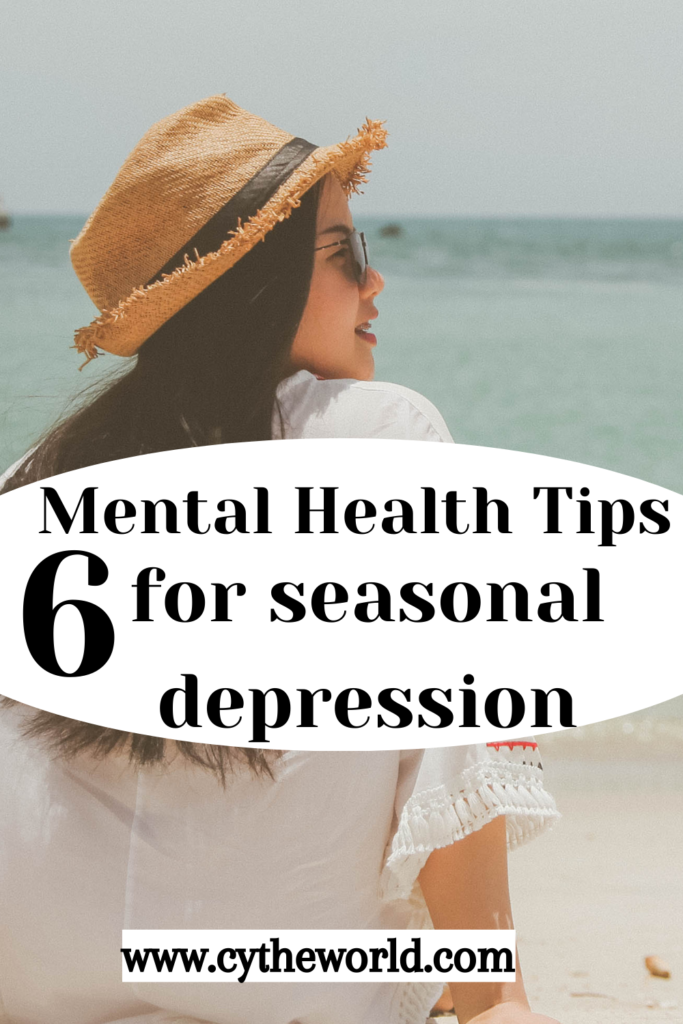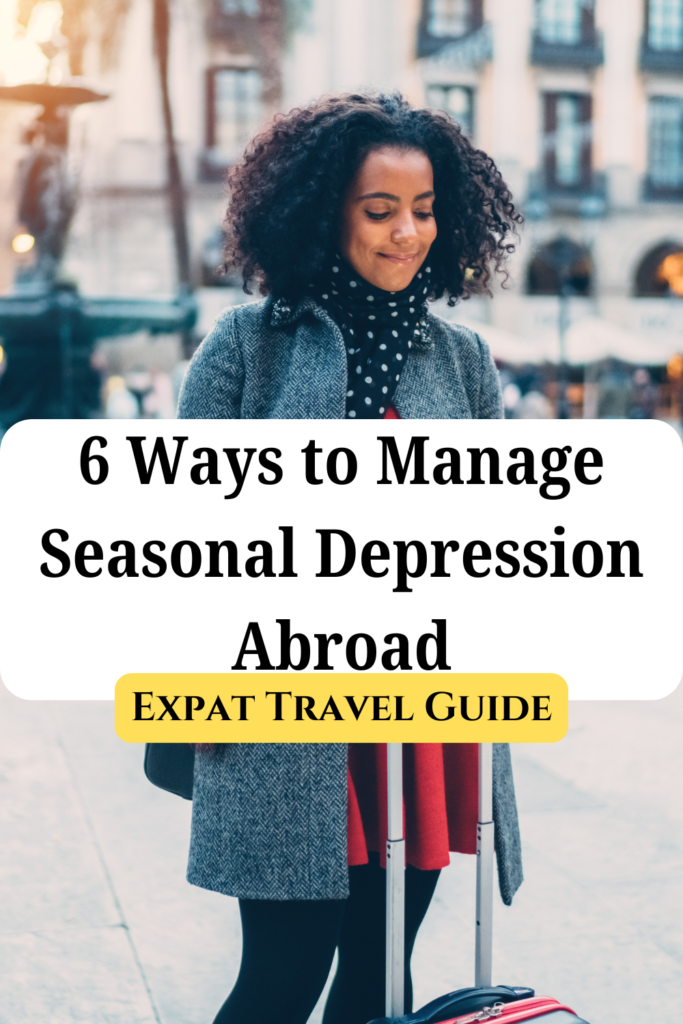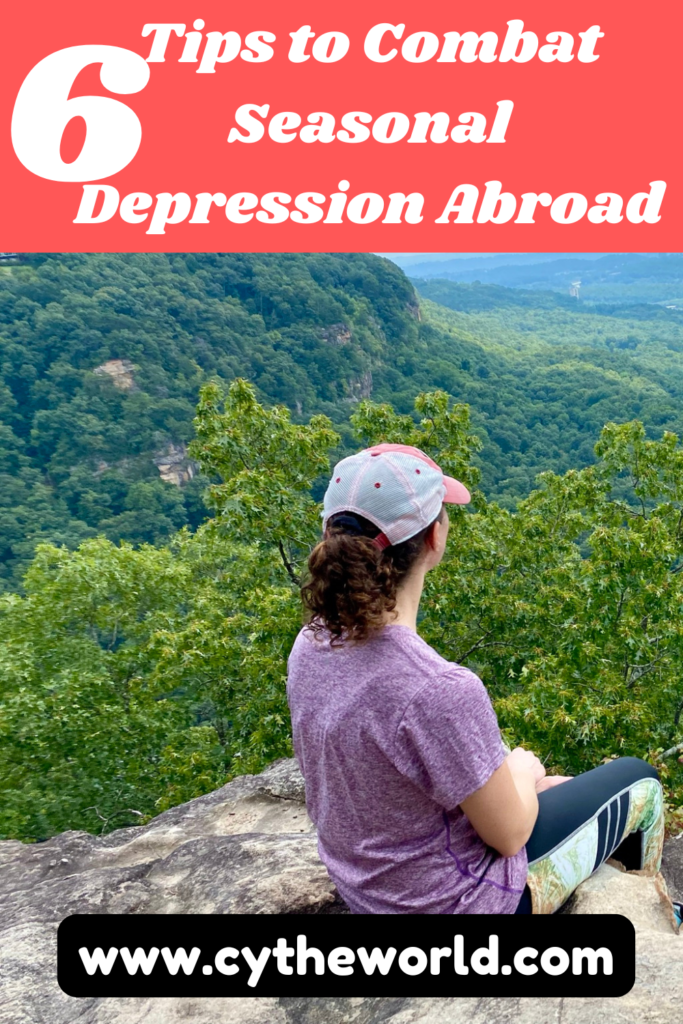The fall season is here, and as of November 3rd, 2024, we have pushed our clocks one hour backward. Setting the clock back means that the nights are longer and the days are shorter. Although the cozy season brings a new sense of adventure, it is also a time when many people suffer from seasonal depression. According to the American Psychiatric Association, 5% of Americans suffer from seasonal depression, also known as Seasonal Affective Disorder(SAD). Although some of us experience it at home, experiencing seasonal depression while living abroad can be a challenging reality for many expatriates. The environmental shift and seasonal changes can trigger feelings of sadness, isolation, and lethargy. Hence, adopting healthy strategies tailored to your unique situation is crucial to combat these feelings and improve your overall well-being.

This comprehensive guide will explore six healthy ways to combat seasonal depression while living abroad. From light therapy to connecting with family and friends back home, these practical tips aim to uplift your spirits and foster a sense of belonging, even in a foreign land. By incorporating activities you love and engaging with local acquaintances, you can create a fulfilling lifestyle that counters the impact of seasonal changes. Whether looking for ways to brighten your home or seeking that much-needed connection with others, these strategies will help you navigate life’s emotional ups and downs while living abroad. This guide wants you to embrace the opportunity to enhance your mental health and explore the world around you! Before we go into details, here is my experience with dealing with seasonal depression while living abroad.
My Experience With Seasonal Depression Abroad
Living abroad has given me more life experiences than I can remember. A couple of experiences challenged me. One was experiencing seasonal depression. This happened while I was trying to integrate into a new country. One of those experiences happened when I moved to Belgium and experienced seasonal depression for my entire year there. I moved to Belgium in September 2020 as we prepared for the fall season. As a New Englander, I know the fall season has many ups and downs. Therefore, I am psychologically prepared for shorter days and unpredictable weather patterns. However, I realized even with my extensive experience with dealing with gloomy weather, I was not prepared for the vulnerability of seasonal depression. This happened while I was trying to integrate into a new country.
The months of September and October in Belgium were great. Fall is a great time to visit Belgium as the temperature is milder and fewer crowds are at the most popular attractions. However, being a tourist varies from being an expatriate. A tourist only stays for a few weeks and focuses on having as many adventures as possible. An expat living abroad has to make that new country their home because they are either living abroad for work or studies. Therefore, the way they spend their time abroad varies. As an expat, you have to deal with bureaucracies and work on getting a residency card. If you are studying abroad, you are trying to understand your curriculum and become accustomed to the different teaching or learning styles. If you move abroad for work, you also try to adapt to the different workstyle. These tasks require you to have energy, be in the right mindset, and be self-determined. As previously discussed, solo traveling forces you to practice self-agency. In the early days of your time abroad, you only have zero to a few local support systems. Therefore, you are your hypeman or hypewoman. Hence, experiencing seasonal depression can deepen the challenges of living abroad. That is why my time in Belgium was challenging.

When I moved to Belgium, I had yet to secure an apartment. Every day, I needed to go apartment searching and sniff through the internet to find a legitimate place to live. When the school year started, I had to commute from Aalst, where I was staying at a family friend’s place, to Ghent, the city I needed to live in as I attended Ghent University. From commuting daily to searching for an apartment and trying to keep up with my studies, I needed all the energy to accomplish all my tasks. I felt overwhelmed when the season changed, and it started getting darker around 4 PM. I had a few support systems, and the Belgian bureaucracies on how to get an apartment, have a domicile, and get a bank account forced me to constantly be on the move and find solutions to start my integration process in peace. As the gloomy weather started, I needed an extra boost to ensure I cared for my needs. When I finally got an apartment and received my residence card, it was time to focus on my master’s program. However, I struggled with seasonal depression and felt depleted after the energy I spent looking for an apartment. Therefore, I needed to find any remedy to lift myself. Here are six things I constantly did to be able to manage my seasonal depression and integrate into a new city.
6 Ways To Combat Seasonal Depression Abroad
Before we dive into these tips, it is essential to state that I am not a medical professional. The tips I am offering are practices I researched and practiced myself to be able to manage my life abroad. As someone who lived away from family and my hometown in various countries, I have experienced many ups and downs, and seasonal depression has been the center of my challenges while living abroad. Hence, I am writing about it for anyone in that position. However, you should research, speak to a healthcare professional, and utilize what works for you. Without further adieu, here are six ways to combat seasonal depression while living abroad.

- Take Iron Pills Early
The first step to combatting seasonal depression is to take iron supplements early. As seasonal depression manifests during the fall and winter months when daylight hours are shorter, taking iron pills early before the gloomy weather starts can play a crucial role in combating this condition. Iron is essential for producing hemoglobin, which carries oxygen in the blood. Low iron levels can lead to fatigue, a common symptom of anemia and depression. When individuals experience low energy and tiredness, they may become less active and withdraw from social interactions, exacerbating feelings of sadness. Hence, by ensuring adequate iron intake, people may be more energetic and motivated to engage in activities that enhance mood. Studies suggest that individuals suffering from SAD often have low levels of certain nutrients, including iron. Supplementing with iron can help restore these levels, improving overall mental and physical well-being.
Iron also synthesizes neurotransmitters like serotonin, which regulate your mood. Higher iron levels can potentially lead to elevated serotonin production, fostering a sense of well-being and reducing symptoms of depression. Taking iron pills early in the season, before symptoms become overwhelming, can be a preventative measure. As expats looking to integrate into new countries, you need all the energy you can get to facilitate your integration. Waiting when you start to feel depressed will cause you to lose valuable time you need to take care of your other priorities while abroad. Addressing iron deficiency early in the season can improve your energy levels and strengthen your emotional resilience during the challenging winter months.

- Use light therapy
The second method I used to help combat seasonal depression is light therapy. Living in Belgium, I wake up ready to take on the day. However, whenever I open my windows and see how dark and gloomy it is outside, I immediately lose interest in getting work done and will go back to bed and watch movies or so to boost my mood. As mentioned above, I lived in Belgium for my master’s program. Therefore, I needed to be on top of things to complete my master’s degree successfully. Having bouts of depression or feeling down after seeing how dark and gloomy it was outside was preventing me from getting my work done. It came when I could not afford to procrastinate, and forcing myself to push through took a tremendous toll on me. That’s how I started implementing light therapy.
Light therapy is a treatment method that mimics natural sunlight, helping to elevate mood and improve overall well-being. To use light therapy effectively, invest in a high-quality light therapy box. Look for a box with at least 10,000 lux of light and a UV filter to protect your skin. Place the light box at eye level, about 16 to 24 inches from your face. Use it for about 20 to 30 minutes in the morning to help regulate your body’s internal clock. Consistency is critical; you need to make light therapy a part of your daily routine. It’s best to start sessions in early fall before symptoms of seasonal depression intensify. Try to position yourself in a well-lit area while engaging in activities such as reading or working so you can enjoy the benefits of light therapy without disrupting your daily tasks. Remember that not everyone will find it helpful. Therefore, monitoring your mood as you begin this treatment method is crucial. However, try it. I found that by incorporating light therapy into your routine, you can effectively combat seasonal depression and improve your quality of life during the darker months of the year or when you live in a place like Belgium that can have gloomy days in the summer as well.

- Connect with Family & Friends Back Home
Another way to combat seasonal depression is to connect with family and friends back home. Staying connected with family and friends back home is essential for maintaining strong relationships and a sense of belonging, especially when you’re away for work, study, or adventures. As mentioned, you need a robust local support system in the early months of your time abroad. You may not have made friends yet with whom you can trust to be vulnerable. Therefore, keeping and maintaining contact with your support system at home is vital. In today’s digital age, distance no longer matters. There are numerous ways to bridge the distance and foster essential connections with family and friends miles away. One of the most effective methods is through regular video calls. Platforms like Zoom, Skype, or FaceTime allow you to see and hear your loved ones in real-time, making conversations more personal. One routine to implement is to schedule weekly catch-ups. By doing so, you give yourself something to look forward to. It also ensures that everyone is up-to-date with each other’s lives.
Besides video calls, social media platforms can help you stay engaged with family and friends’ day-to-day activities. Sharing photos and updates or participating in group chats can keep you in the loop, allowing you to celebrate milestones and share experiences, even from afar. Communicating with loved ones will make them feel more connected to your life. Not only are they ensuring your sense of normalcy, but being connected gives you a sense that you are not alone. Your support system will cheer you on and lift you throughout the early fall and winter challenges. Another communication method to try is handwritten letters or postcards. Writing letters helps you feel distressed as it is a journaling tactic. It gives your many something to cherish and adds a personal touch to how you connect with them. Sending postcards also allows your family to see the cool places you can access, and it is a way for them to travel with you. Hence, staying connected can foster deeper relationships, enhance your well-being, and provide a comforting reminder that you have a support network cheering for you no matter where you are.

- Decorate Your House
One way to boost my mood, whether at home or abroad, is to decorate my house. As seasonal depression occurs during the fall and winter, decorating your house is an exciting opportunity to express your personality and create a space uniquely yours. With the fall and winter seasons bringing many holiday festivities, you can decorate according to the theme. In October, there is Halloween! You can use that time to revamp your living space to match the Halloween thriller. In November, Americans celebrate Thanksgiving. You can use this opportunity to decorate your house as you prepare for a solo Thanksgiving abroad. In December, there is Christmas, so why not use the time to make your apartment a jolly dwelling? The decorating process begins with understanding your style. Take a moment to explore various design themes—such as modern, rustic, bohemian, or minimalist—to find what resonates with you. Doing this exercise helps you to have something to focus on. It gives you something fun to think of and do and keeps your mind from feeling lonely and depressed.
Once you have a style in mind, consider the color palette. Selecting a cohesive color scheme can significantly affect the ambiance of your home; soft, neutral tones can create a calm environment, while bold colors can inject energy and vibrancy. The next thing to think about is the layout of your rooms. Furniture placement is crucial; aim for a flow that encourages movement and conversation. Use area rugs to define spaces and create a cozy atmosphere. When choosing furniture, prioritize comfort and functionality, ensuring each piece complements your overall design theme. Don’t forget the power of accessories as travelers who may live abroad for a short time buy furniture you can reuse throughout your time abroad. Therefore, you will not need to buy new furniture to decorate for different seasons. Hence, accessories are crucial. Adding decorative elements like throw pillows, art pieces, and plants can bring life to your home. Choose artwork that reflects your interests and style, and consider personalizing shelves with photographs or souvenirs from your families. Try also to find ways to incorporate personal touches through DIY projects, family heirlooms, or items that tell your story. By thoughtfully curating each element, you’ll create a harmonious environment that looks beautiful and feels like home.

- Incorporate Activities You Love
Another way to combat seasonal depression is by incorporating activities you love. Incorporating activities you love into your daily life is crucial for fostering happiness and maintaining a balanced lifestyle. Engaging in activities that genuinely bring you joy enhances your mood and increases your productivity and creativity. Identifying the activities that resonate with you, whether painting, hiking, reading, cooking, or playing a musical instrument, is essential. Once you have these passions, find ways to add them to your routine. If you love painting, set aside a specific time each week to let your creativity flow; consider transforming a corner of your home into an inspiring workspace. Plan weekend trips or explore local trails after work if hiking is your escape. The key is prioritizing these activities, treating them as essential appointments rather than optional extras. Being busy with fun activities helps you find joy while integrating into your new environment.
Moreover, consider how these hobbies can intersect with your social life. Join local clubs or online communities that align with your interests, allowing yourself to connect with like-minded individuals. These social settings enhance your enjoyment and help form valuable relationships. Incorporating beloved activities can also provide a much-needed break from daily stressors. Whether it’s a short meditation session, a dance class, or tending to a garden, these moments of joy recharge your spirit and improve your overall well-being. Remember that your new city or country has many unique opportunities to enhance your integration experiences. As someone who loves perfumes, I used my opportunity when living in France to go to a perfume workshop and learn about perfumes, how to create them, and their different scents. While living in Belgium during the pandemic, I utilized online communities to interact with people who liked the same thing I did. I asked locals about Belgian recipes to incorporate into my cooking and where to sign up for a chocolate-making class. Doing all these uplifted me in times of seasonal depression and gave me something to take my mind off the challenges of trying to integrate while confronting the gloomy seasons. Hence, making time for what you love is a vital investment in yourself.

- Connect with Local Acquaintances
Lastly, another way to combat seasonal depression is by connecting with local acquaintances. Although I stated earlier that you may have a weak local support system in the first few months, you may have at least one or two people you will connect with. As an international student living abroad, you will meet other international students who share the same uncertainty. Also, seasonal depression does not only affect travelers, so there are people you can connect with that can be a great support system. Therefore, use this relationship to help yourself rise above feeling alone during the gloomy season in a foreign country. Connecting with local acquaintances can significantly enrich your personal and professional life. Connecting with local acquaintances builds a more vibrant and engaged community. However, many people need help figuring out where to start when creating their chosen family abroad. Where can you go to meet them? How do you foster deeper relationships where you can trust them? The answer is to explore various avenues to meet new people in your area.
Consider joining local clubs, organizations, or hobby groups that align with your interests. Whether you’re into sports, literature, art, or volunteering, these gatherings often attract individuals with similar passions, creating a natural foundation for relationships. Another effective way to connect is participating in community events such as farmers’ markets, festivals, or workshops. These settings encourage social interaction, allowing you to discuss and share experiences with fellow attendees. Do not be afraid to introduce yourself—people are generally open to meeting newcomers, especially in casual environments. Social media platforms can also serve as valuable tools for fostering connections. Join local community groups on platforms like Facebook or Nextdoor, where you can engage in discussions, ask for recommendations, and even arrange meetups with like-minded individuals. Finally, maintaining and nurturing relationships with your local acquaintances is essential. Regularly reach out for coffee, attend community activities, or check in to see how they’re doing. This proactive approach helps to solidify your bonds and creates a supportive network. By actively engaging with local acquaintances, you expand your circle and cultivate a sense of belonging and community that enhances your everyday life.

Living abroad provides many rich experiences to enhance your personal and professional life. However, there are some ups and there are some downs. During the downs, travelers should not concede and let the downs define the incredible adventure they decided to take on; hence, why it is crucial to find ways to combat feelings of loneliness and depression while living abroad. Although the fall season brings a new opportunity to discover a new country, its seasonal shift can be more problematic for many to navigate. Therefore, travelers must find ways to rise above the challenges of experiencing seasonal depression while trying to integrate into a new country. By implementing these tips, travelers will have a better time to prepare and prioritize their mental health while living abroad. Taking iron pills early in the season helps the individual have energy and boosts their mood. Light therapy allows you to be awake and alert and not fall prey to the gloomy weather. Connecting with family and local acquaintances ensures a community of supporters to uplift you. Decorating and incorporating activities you enjoy gives you something creative to do that takes your mind away from stress. By utilizing these tips, you give yourself the gift of joy, community, and freedom to take care of what matters. Therefore, do not despair when the fall season comes. Use these techniques and pick yourself up to enjoy your travel adventures during the fall and winter seasons.
As always, thank you for reading. Like, share, and subscribe to our mailing list for valuable tips on enjoying a successful time abroad.
Until next time, safe travels!
Xoxo,
Cy!